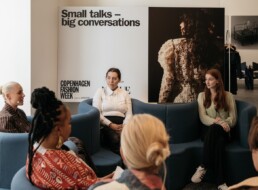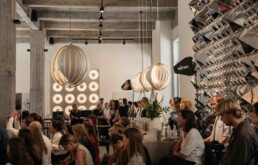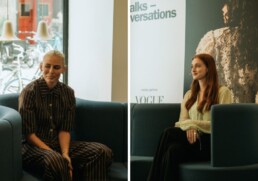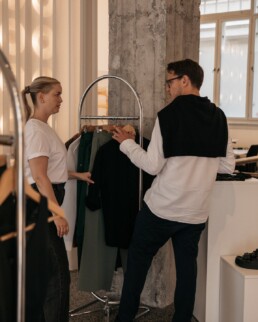Meaningful fashion: Zalando puts adaptive design on the agenda at Copenhagen Fashion Week
🇩🇰 Du finder den danske version af denne artikel her.
In the heart of Copenhagen, inside the characterful VERPAN space on Møntergade, Copenhagen Fashion Week turned the spotlight toward a topic that has long been overlooked — but is finally starting to find its place in both design thinking and business strategy: adaptive fashion.
At its core, adaptive fashion is about clothing designed with the needs of people with physical disabilities in mind — without compromising on style, comfort, or dignity.
The talk was part of the “Small Talks – Big Conversations” series, Copenhagen Fashion Week’s official panel program, with Zalando leading the conversation on this particular day.
“It’s about dignity — and independence.”

All photos in this article were taken by Tonya Matyu.

The industry is finally taking it seriously
The panel was moderated by Kay Muwoki, Senior Diversity & Inclusion Manager at Zalando, and featured Lauren Wasser, model and activist; Emma Matell, casting director; and Francesca Harvey, apparel designer at Adidas.
The conversation quickly focused on a core insight: adaptive fashion isn’t a new concept — the challenge has existed for a long time — but only recently has the industry begun to take it seriously.
In this context, Zalando has emerged as a key driver, dedicating itself to the topic over the past few years. Their commitment goes beyond words, involving the development of real collections in collaboration with major brands and showcasing them on Zalando’s vast platform across Europe.
Francesca Harvey shared insights on Adidas’ first adaptive collection designed specifically for wheelchair users. The collection is crafted with both athletic performance and everyday wear in mind — and will be worn at the Paris 2024 Paralympic Games.
“It’s not about pity. I have a good life.”

Lauren Wasser & Francesca Harvey
Lauren Wasser’s personal story left a powerful impression, highlighting why adaptive fashion is about much more than just design. After losing both legs in 2012 due to menstrual-related toxic shock syndrome (TSS), she has become a passionate and respected advocate for women’s health and a more inclusive fashion industry.
Known as “the model with the golden legs,” behind her prosthetics lies a strong and uncompromising voice. She spoke about how even small details — like magnetic buttons on a shirt — can make a huge difference in enabling her to dress independently. When functionality meets style, clothing becomes about more than just fabric — it’s about dignity and autonomy.
“It’s not about pity. I have a good life,” she said repeatedly, with conviction. Not as an excuse, but as a reminder that life can be fulfilling — even when the body looks different — as long as you have the opportunity to be yourself.
When Brands Truly Make a Difference
For us at dontt.dk, it was a clear example of how a major European company like Zalando can truly make a real difference for individuals—not with empty promises, but by creating solutions that empower more people to take control of their daily lives.

WEEKLY BRIEF
Culture, business & inspiration — straight from Copenhagen to your inbox. Join over 55,500 subscribers! We send out updates once a week.


